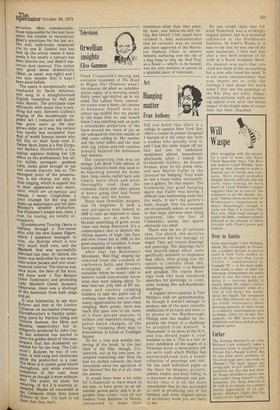'Television
Orwellian
insights
Clive Gammon 1 Frank Cvitanovich's moving and evocative treatment of The Road to Wigan Pier (Thames) wasn't ten minutes old when an unbidden action replay of a morning nearly thirty years ago started up in my mind. The Labour Party committee rooms over a dusty old cinema in Swansea, myself with my school cap stuffed into my pocket in the hope that no one would know I was mitching and, on quite a remarkable porportion of the faces around me, tears of joy as the unhoped-for election results of 1945 came rolling in. My mother and the other ladies and the men with big yellow-and-red rosettes honestly believed the millenium had dawned.
The connecting link was an orange, Left Book Club edition of George Orvvell's book that used to be knocking around my home then, limp covers curled back and clearly more often and more thoroughly read than the economic tracts and other pieces of heavy going that had found their way into the house.
There were Orwellian insights that I'd forgotten. It took a very perceptive man indeed in 1936 to raise an objection to slum clearance, not as such, but because something of great social value was being destroyed. It's a commonplace now to deplore the lifeless aspesis of high rise flats and new towns but in 1936, to the great majority of socialists, it must have sounded like a betrayal.
After that the Resistance Movement, 'Red Flag' singing far removed from the cosiness of conference halls, and Orwell's scourging of middle-class socialists, whom he wasn't able to believe could conceivably know what they were talking about. To bear him out, jolly film of BT ses sions and country camping holidays to take the pallor out of working class skins and to afford matey opportunities for inter-class mingling. More grimly, there was much film quite new to me, some of it from private sources, of strikers and marchers rioting, of police baton charges, of the hungry tramping their way to demonstrate in Leeds or Trafalgar Square. So far, a true and worthy rendering of the book. In the last third of the film, though, Cvi tanovich, out on his own now, at tempted something else. How far had we inched towards the New Jerusalem since the agitation of the 'thirties? Not far, if at all, came the answer.
It would have been a lot safer for Cvitanovich to have stuck to his text, to have given us an ad
mirable period piece, and it is arguable that comic cuts of our
leaders from Baldwin to Heath, juxtaposed to make their utterances sillier than they possibly were, was below-the-belt hitting. But Orwell, I felt, might have relished it. And, sentimentalist that he certainly was, he would also have approved of the Morriston Orpheus Choir, in miners' helmets, surfacing over the rim of a slag heap to sing the 'Red Flag' as a finale — which, to be honest, was my only moment of unease in a splendid piece of television.


































































 Previous page
Previous page